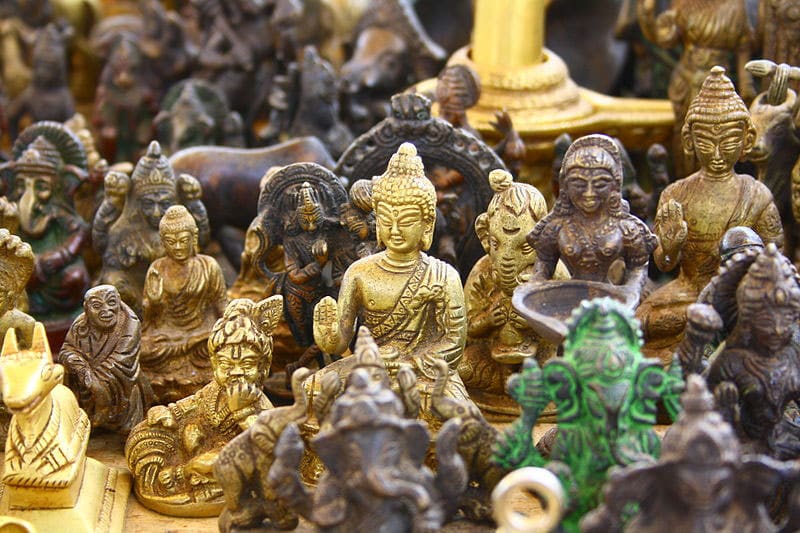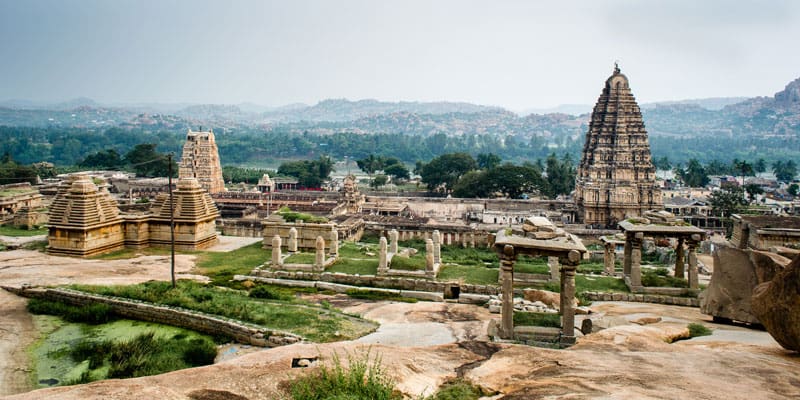Nestled amidst the mesmerizing ruins of the UNESCO World Heritage Site of Hampi in Karnataka, India, Hampi Bazaar stands as a testament to the rich history and cultural heritage of the region. This vibrant marketplace, located at the foot of the majestic Virupaksha Temple, offers visitors a unique blend of historical significance, architectural marvels, shopping delights, culinary wonders, and cultural experiences.
Historical Significance of Hampi Bazaar
Hampi Bazaar, also known as Virupaksha Bazaar, traces its origins back to the heyday of the Vijayanagara Empire in the 14th century. During this period, Hampi served as the capital of one of the most powerful and prosperous empires in South India. The bazaar thrived as a bustling commercial center, attracting merchants from distant lands who traded in precious gems, spices, textiles, and other commodities. Today, remnants of this glorious past can be seen in the form of ancient ruins and structures that line the streets of Hampi Bazaar.
Architectural Marvels in Hampi Bazaar
As visitors meander through the narrow lanes of Hampi Bazaar, they are transported back in time by the awe-inspiring architecture that surrounds them. From the towering gopurams (gateway towers) of the Virupaksha Temple to the intricate carvings adorning the pillars of nearby monuments, every corner of the bazaar exudes a sense of grandeur and splendor. Among the notable landmarks are the Monolithic Bull, the Kadalekalu Ganesha Temple, and the Sasivekalu Ganesha Temple, each showcasing the architectural prowess of the Vijayanagara artisans.
Shopping Experience in Hampi Bazaar
Hampi Bazaar offers a one-of-a-kind shopping experience, where modernity seamlessly blends with tradition. Visitors can explore a plethora of shops and stalls that line the streets, offering a diverse range of handicrafts, textiles, jewelry, and souvenirs. From intricately woven silk sarees to vibrant tribal artwork, Hampi Bazaar caters to every taste and budget. Bargaining is a common practice here, so don’t hesitate to haggle for the best deals.
Culinary Delights of Hampi Bazaar
No visit to Hampi Bazaar is complete without indulging in its culinary delights. The bazaar is dotted with eateries and cafes serving an array of mouthwatering dishes, ranging from authentic South Indian cuisine to continental fare. Be sure to sample local specialties like bisi bele bath (spicy rice and lentil dish), masala dosa (crispy crepe filled with spiced potatoes), and filter coffee, renowned for its rich flavor and aroma.
Cultural Activities and Performances
Hampi Bazaar is not just a place to shop and eat; it’s also a cultural hub where visitors can immerse themselves in the vibrant traditions of Karnataka. Throughout the year, the bazaar hosts a variety of cultural activities and performances, including classical music concerts, dance recitals, and art exhibitions. Visitors can witness colorful processions during religious festivals like Hampi Utsav and Virupaksha Car Festival, offering a glimpse into the region’s rich cultural heritage.
Accommodation Options in Hampi Bazaar
For those looking to prolong their stay in Hampi Bazaar, there are plenty of accommodation options available to suit every budget and preference. Travelers can choose from heritage hotels, guesthouses, homestays, and backpacker hostels, each offering a unique experience. Many of these establishments are located within walking distance of the bazaar, allowing guests to explore the area at their leisure.
Transportation to and from Hampi Bazaar
Hampi Bazaar is well-connected by road and rail, making it easily accessible from major cities like Bangalore, Hyderabad, and Goa. The nearest railway station is Hospet Junction, located approximately 13 kilometers away, from where visitors can take a taxi or bus to reach Hampi. Once in the town, getting around is easy, with options like bicycles, auto-rickshaws, and local buses readily available.
Safety Tips for Visitors
While Hampi Bazaar is relatively safe for tourists, it’s essential to exercise caution and common sense while exploring the area. Keep your belongings secure, especially in crowded places, and be wary of pickpockets and scams. Respect local customs and traditions, dress modestly when visiting religious sites, and avoid wandering alone at night.
Sustainability Initiatives in Hampi Bazaar
In recent years, Hampi Bazaar has embarked on various sustainability initiatives to preserve its cultural heritage and natural environment. These include waste management programs, renewable energy projects, and efforts to promote eco-friendly tourism practices. Visitors are encouraged to support these initiatives by minimizing their environmental footprint and respecting the delicate ecosystem of Hampi.
Best Time to Visit Hampi Bazaar
The best time to visit Hampi Bazaar is during the winter months, from October to March, when the weather is pleasant and conducive to outdoor activities. Avoid the scorching summer heat and the heavy monsoon rains, which can make sightseeing challenging. The months of November and December are particularly popular, as they coincide with various cultural festivals and events.
Hampi Bazaar: A Photographer’s Paradise
For photography enthusiasts, Hampi Bazaar offers a plethora of opportunities to capture stunning shots against the backdrop of ancient ruins and vibrant street scenes. Whether you’re an amateur photographer or a seasoned pro, you’ll find endless inspiration in the architectural wonders and cultural nuances of this historic town. Don’t forget to pack your camera and unleash your creativity as you explore Hampi Bazaar’s photogenic charm.
Exploring Nearby Attractions
While Hampi Bazaar itself is a treasure trove of historical and cultural wonders, there are plenty of nearby attractions waiting to be explored. Take a short drive or hike to iconic landmarks like the Royal Enclosure, Lotus Mahal, and Elephant Stables, each offering unique insights into Hampi’s illustrious past. Nature lovers can also venture into the surrounding countryside, where lush landscapes and hidden gems await discovery.
Preserving the Heritage of Hampi Bazaar
As tourism continues to grow in popularity, it’s essential to balance development with the preservation of Hampi’s rich heritage. Local authorities, along with conservation organizations and community stakeholders, are working together to implement sustainable tourism practices and safeguard the cultural integrity of Hampi Bazaar. By supporting responsible tourism initiatives and respecting the sanctity of this historic site, visitors can help ensure that Hampi’s legacy endures for generations to come.
Conclusion
In conclusion, Hampi Bazaar is much more than just a marketplace; it’s a journey through time and culture, where history meets modernity in a harmonious blend of tradition and innovation. Whether you’re drawn to its ancient temples, vibrant bazaars, or rich cultural heritage, Hampi Bazaar promises an unforgettable experience that will leave you enchanted and inspired.
FAQs
- Is Hampi Bazaar safe for solo travelers?
- Yes, Hampi Bazaar is generally safe for solo travelers, but it’s essential to take precautions and be aware of your surroundings, especially at night.
- What are some must-try dishes in Hampi Bazaar?
- Some must-try dishes in Hampi Bazaar include bisi bele bath (spicy rice and lentil dish), masala dosa (crispy crepe filled with spiced potatoes), and filter coffee.
- Are there guided tours available in Hampi Bazaar?
- Yes, guided tours are available in Hampi Bazaar, offering insights into the history, architecture, and culture of the region. These tours can be booked through local travel agencies or hotels.
- Can I buy authentic handicrafts in Hampi Bazaar?
- Yes, you can buy authentic handicrafts made by local artisans in Hampi Bazaar, including pottery, textiles, jewelry, and souvenirs. Be sure to visit the local markets and shops to find unique treasures.
- What is the best way to explore Hampi Bazaar?
- The best way to explore Hampi Bazaar is on foot or by bicycle, allowing you to soak in the sights and sounds of this historic town at your own pace. Alternatively, you can hire a local guide to help you navigate the labyrinthine streets and learn more about Hampi’s fascinating history and culture.





